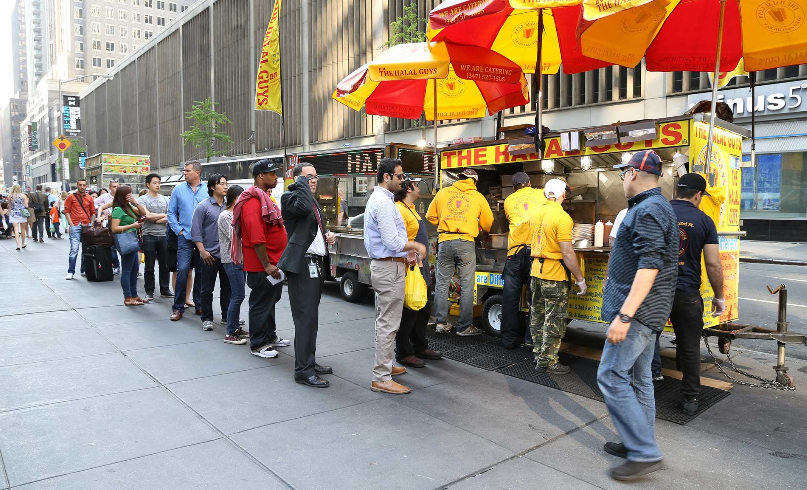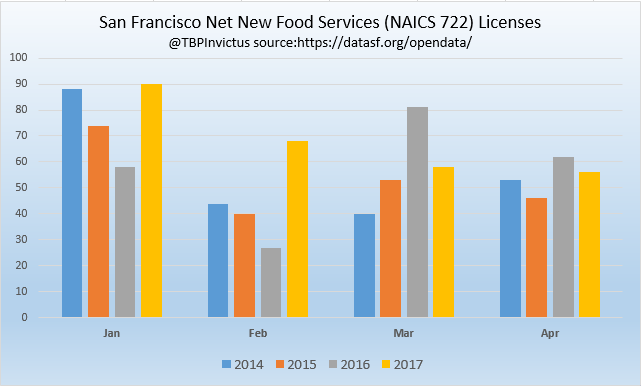One of the things I write about incessantly are the filters we create for ourselves, and their impact on our ability to objectively judge data. Our biases, prejudices, ideologies and partisan leanings all impact how we perceive and think about outside info.
Nowhere do we see this more egregiously enacted than in anything having to do with the minimum wage. When Invictus brought a study to my attention, I was impressed with his objectivity — poorly Yelp reviewed (i.e., weaker) restaurants are negatively impacted by rising minimum wages. Seems quite reasonable a conclusion.
Then the ideologues got a hold of the study, and all manner of imbecility broke out. Don’t worry, our intrepid min wage expert is on the case! -Barry
~~~
@TBPInvictus here:
A recent study out of Harvard Business School – Survival of the Fittest: The Impact of the Minimum Wage on Firm Exit – innovatively looked at Yelp ratings in the San Francisco area with an eye toward assessing the impact of a rising minimum wage on restaurant closures. What husband and wife team Michael and Dara Lee Luca found was that restaurants with lower Yelp ratings are more likely to be nudged toward closure than those with higher Yelp ratings. The stated objective of the study was “to test whether restaurants with lower ratings tend to be closer to the margin of exit.”
The study’s results indicate that, as one might expect, crappier-rated restaurants are more sensitive to increases in the minimum wage than better-rated restaurants. Or, as Michael Luca put it:
LUCA: The restaurants that are already struggling are more likely to be affected by shocks to their cost structure.
Or, put another way:
“You are losing something from the market,” Michael Luca acknowledged. “But what you’re losing is the lower-quality businesses. […] If you’re closest to the margin already, then something like a minimum-wage increase is more likely to push you over the edge.”
Importantly, the study was silent as to the pros or cons of a minimum wage at any level, including its effects on a local economy and/or that economy’s employment situation. However, as the study circulated, some in the conservative blogosphere seized on it and, in some cases, drew their own fantastical conclusions. No opportunity to bash the minimum wage – whether justified or not – shall be allowed to go to waste. (It appears the anti-min-wage crew have all but abandoned Seattle, which also has a higher minimum wage and is currently sporting a 2.8% unemployment rate and a generally thriving economy. But I digress.)
One final point to keep in mind as we move ahead: According to Bloomberg, San Francisco already has the most eateries per capita in the country (followed by the aforementioned Seattle). It’s impossible to know where any municipality’s saturation point is with regard to any industry but, as the old saying goes, trees can’t grow to the sky. There are limits. That said, let’s separate fact from fiction.
San Francisco’s ever-rising minimum wage—set to hit $15 next year—has restaurant owners asking for the check. “At Least 60 Bay Area Restaurants Have Closed Since September,” read a January headline at the website SFist, which partly blamed “the especially high cost of doing business in SF, with a mandated, rising minimum wage that does not exempt tipped employees.” […] Put differently, San Francisco’s minimum wage experiment may be dangerous for your favorite white-tablecloth restaurant—the kind of place where the food is exquisite and can command a premium—but it’s downright deadly for your local white-apron diner.
Indeed, the data I’ve retrieved from the San Francisco area confirm that well over 60 restaurants closed “since September.” In fact, by my count, the number that closed in the last four months of 2016 is somewhere around 218. However, some 280 rose to take their place, so I’m not sure what the fuss is about. Also, as we’ll see again below, the Journal is conflating quality and price; they’re not the same. High-priced does not necessarily mean good quality, and low-priced does not necessarily mean poor quality. More on that a bit further down.
The conclusion: That over the next two years, San Francisco’s restaurant industry — the industry with the highest percentage of minimum-wage workers — will likely shrink, as nearly 6,000 restaurant employers contemplate whether paying $15 per hour salaries is feasible.
That was most definitely not the conclusion.
Reason does some semantic gymnastics to misleadingly – and erroneously – conflate higher Yelp ratings with higher priced food:
That means fewer choices for consumers. Not everyone can afford to eat at a 5-star restaurant all the time (and, honestly, who would want to?), but higher minimum wages might force some mid-level options out of the market and make it harder for new ones to come online.
In New York City, for example, The Halal Guys are rated 4.5 stars on Yelp – as are Le Bernardin and Gramercy Tavern – and have garnered over 8,000 reviews. They’re a food cart.
This Forbes article by Tim Worstall goes the distance, foolishly tying the Harvard study directly to job losses:
We’ve now useful evidence that the various minimum wage rises in and around San Francisco have been leading to the closure of restaurants. That, in turn, would rather suggest that the rising minimum wage cuts the number of jobs in restaurants. Not that this is what the Fight for $15 and similar crowd want to hear but we really are gathering a lot of evidence which shows that a higher minimum wage leads to job losses.
This report by NPR gives a balanced assessment of what the study says and, importantly, what it does not say. Naturally, it decisively discredits Worstall’s assertions, which should come as a surprise to exactly no one:
HARNETT: The Harvard Business School paper shows increasing minimum wage puts pressure on some of these [lower quality] restaurants. And as so often happens in the contentious debate over minimum wage, pundits are drawing conclusions to suit their purposes. They’re saying minimum wage increases hurt the economy and kill jobs. The paper’s coauthors say the study shows no such things. Dartmouth professor Paul Wolfson agrees. The findings are limited to restaurant closures.
Here again the Washington Post:
Importantly, Luca’s study did not look at the impact of wage increases on employment — something he emphasizes. Because food service is a high-churn industry, in which restaurants open and close and employees move around all the time, the fact that one restaurant closes does not necessarily mean more people will be unemployed.
My own quick look at the data for the San Francisco area does not show any decrease in the number of restaurant openings. In fact, over the first four months of the last four years (Jan-Apr, 2014-2017), I calculated net new openings (openings less closures) of 225, 213, 228, and 272. I’d note that anyone opening a restaurant in San Francisco in the last couple of years certainly knows – or should know – what the minimum wage situation is. Any restaurateur who doesn’t should probably be looking for another line of work. In other words, they’re going in eyes wide open and building labor costs into their business model.
The overarching point here – which is fairly intuitive – is that, as coauthor Michael Luca points out (see above), crappier restaurants “are more likely to be affected by shocks to their cost structure.” That would no doubt be the case if said shock came in the form of higher prices for foodstuffs or rent. Using the Lucas’ study to bludgeon the minimum wage is to do it a disservice and showcase a wanton disregard for the facts.
One final note: I’m not (yet) entirely sold on the concept of using Yelp ratings for academic research. It’s certainly novel and innovative and may, in fact, prove to be a very useful tool to which I’ve not given enough thought. I suppose, at the very least, I’d want to filter the data to use only entities with X number of reviews, whatever X might be. There may be other concerns, as well, but probably all of them could be overcome.



